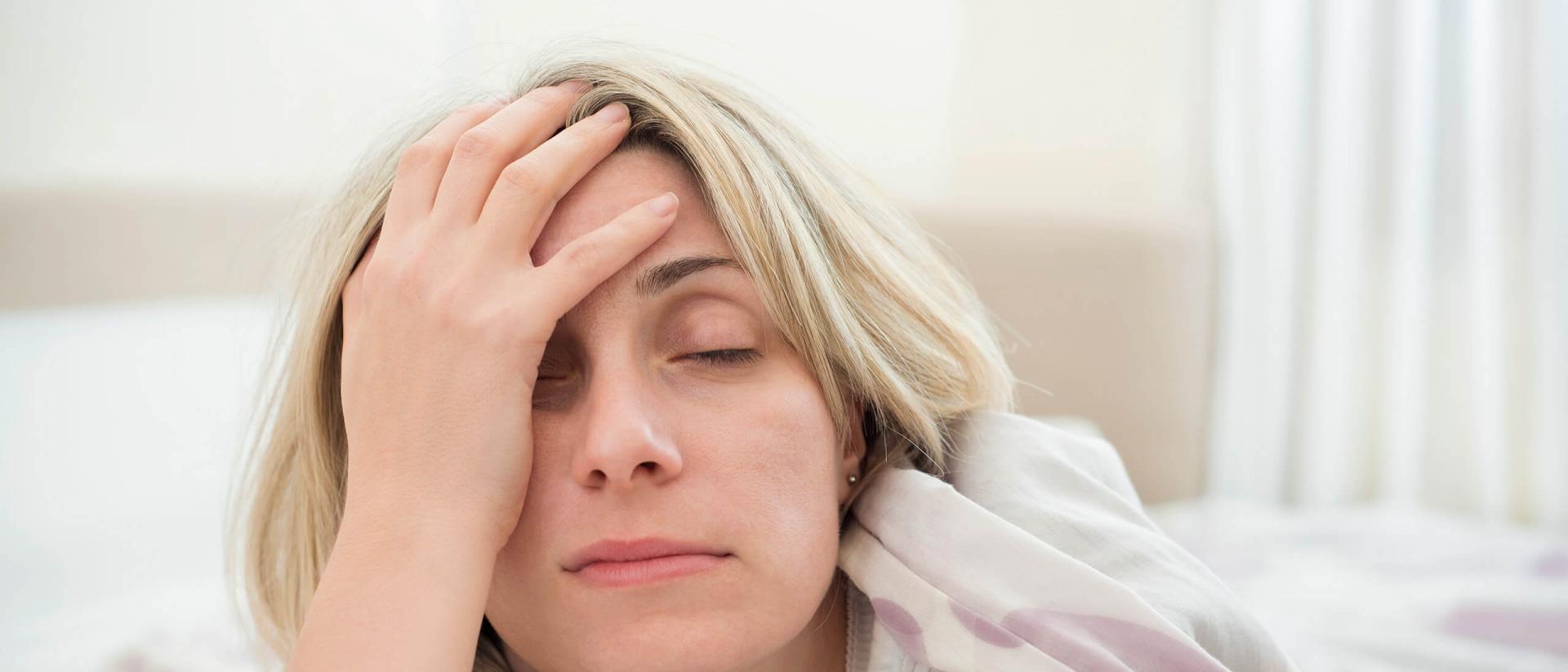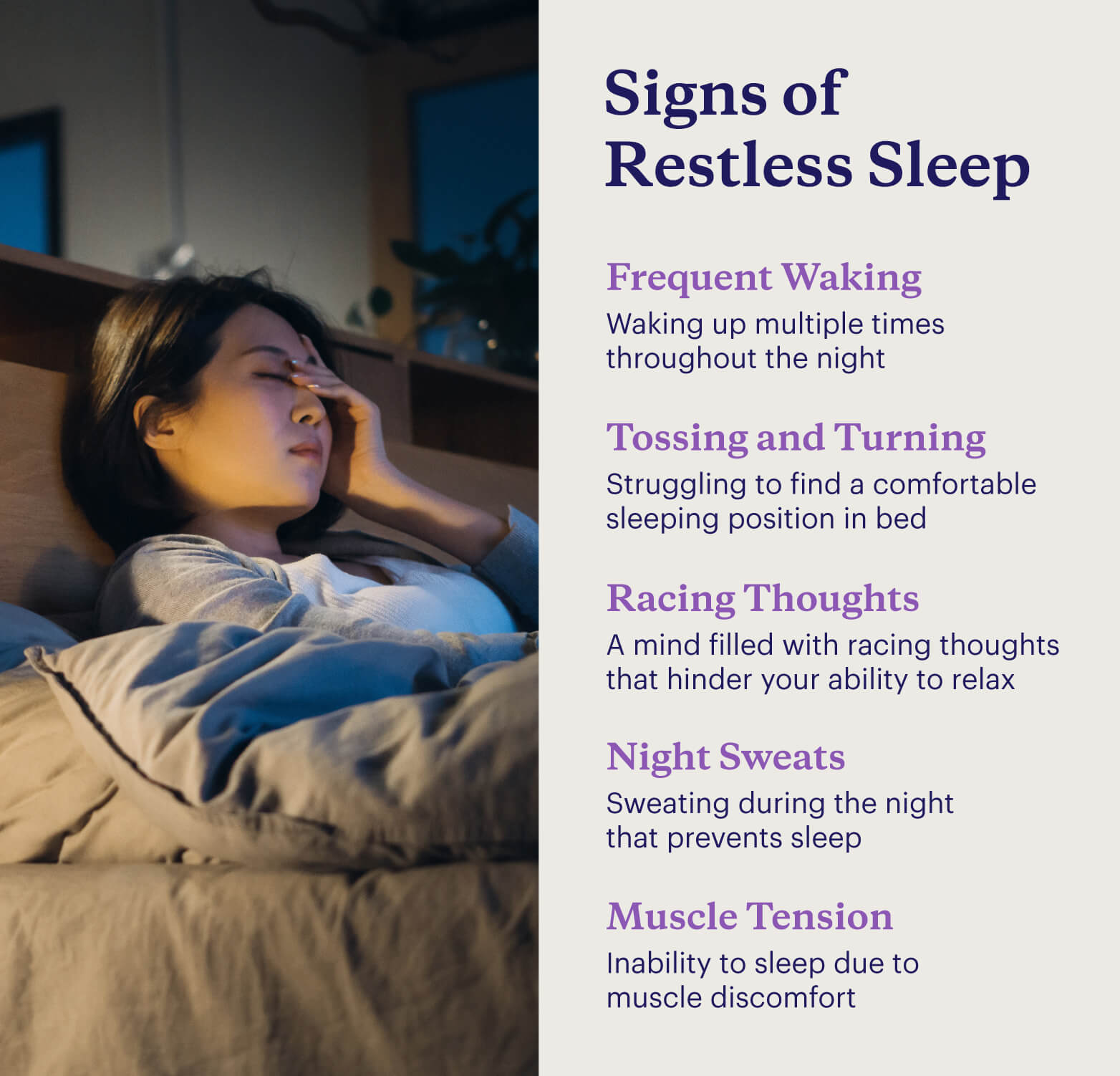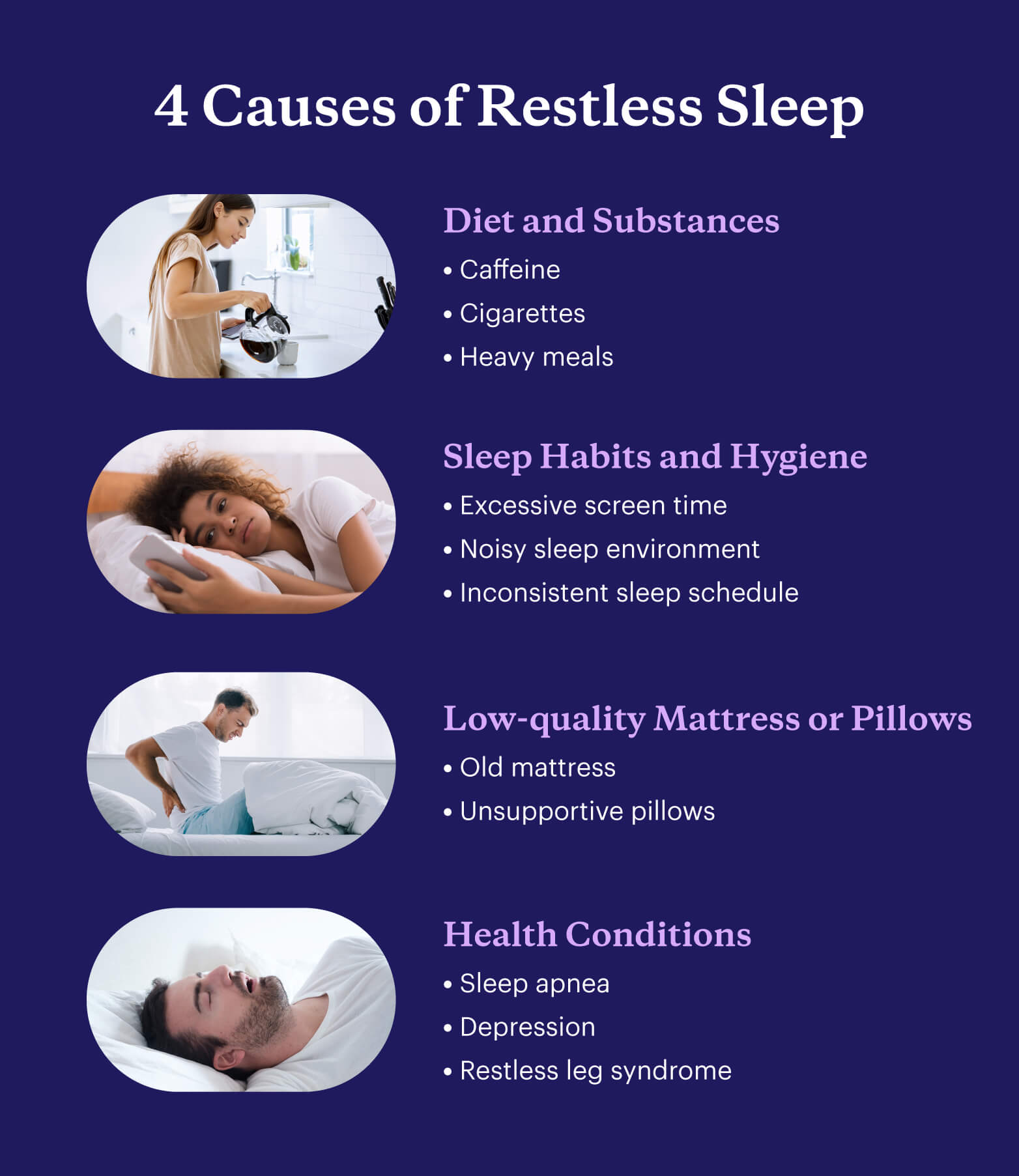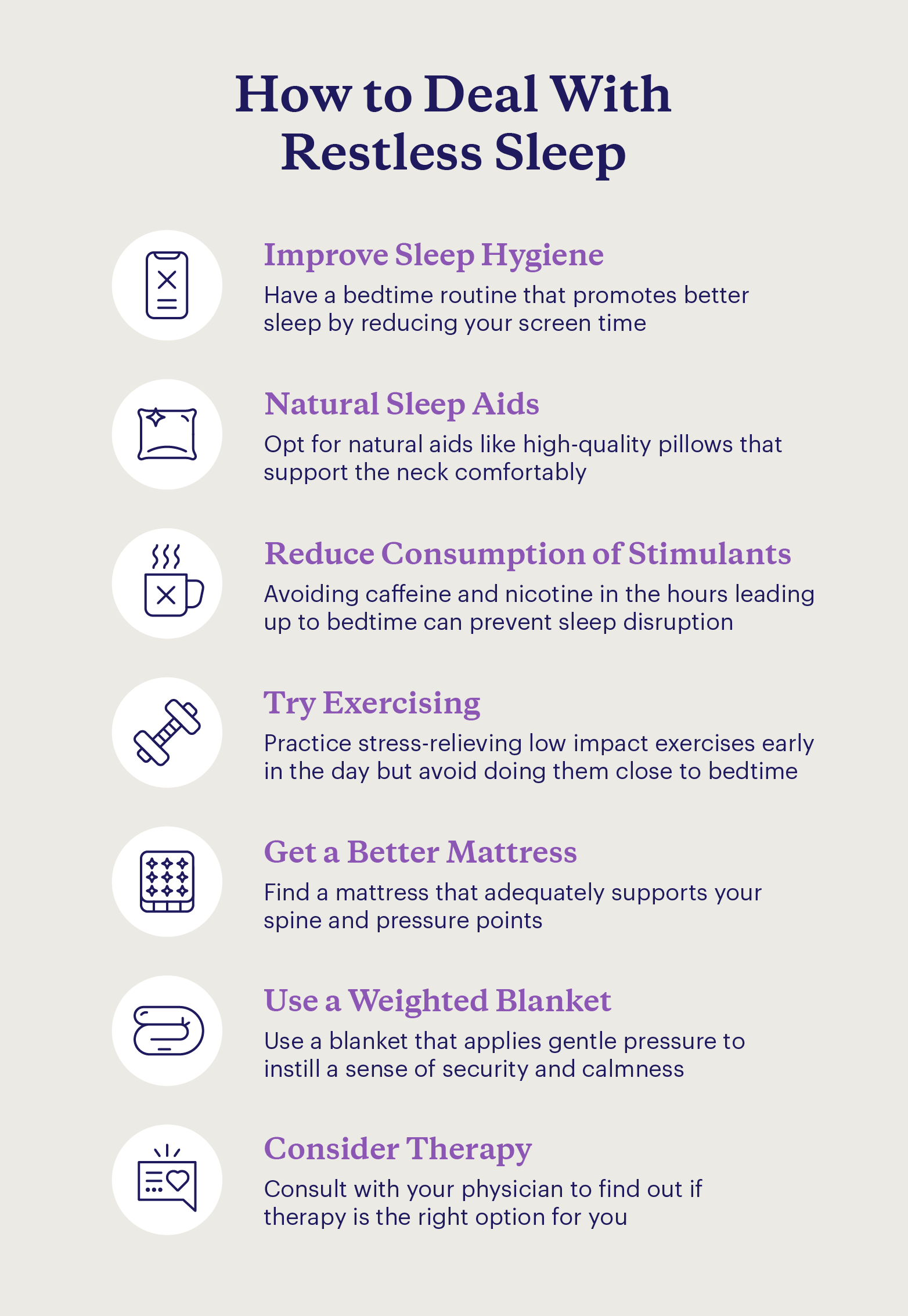
What Causes Restless Sleep? (and How to Fix It)
Various factors can cause restless sleep, including stress, poor sleep habits, underlying medical conditions, and lifestyle choices. Identifying these causes is the first step to improving your sleep quality and overall well-being.
Do you often find yourself struggling to fall and stay asleep throughout the night? If that's the case, you're not alone. According to the Centers for Disease Control and Prevention of the United States, over 50% of adults experience restless sleep.
Restless sleep is a sleep disorder that causes various interruptions in your sleep cycle. These disruptions can leave you feeling restless and exhausted after a full night's rest, and are defined by frequent awakenings, tossing and turning in bed, and general discomfort, which can leave you feeling groggy and irritable the next day.
What causes restless sleep can be attributed to multiple factors like stress, anxiety, poor sleep habits, or underlying medical conditions, and can vary from person to person.
This post dives into some common reasons behind restless sleep and provides practical tips and strategies to help you address them for better sleep and health.
What is Restless Sleep?
As a sleep disorder, restless sleep leads to irritability, mood swings, difficulties coping with stressors, and other outcomes due to disrupted sleep patterns. There are multiple signs that indicate restless sleep, which include:
- Frequent waking: Restless sleep often involves waking up multiple times during the night, preventing you from achieving deep, uninterrupted slumber.
- Tossing and turning: You might find yourself constantly changing positions in bed as you struggle to get comfortable, contributing to the fragmentation of your sleep.
- Racing thoughts: Restless sleep frequently comes with an overactive mind filled with worries, stressors, or racing thoughts that hinder your ability to relax.
- Night sweats: Experiencing sweating during the night can disrupt your slumber and leave you feeling uncomfortable.
- Muscle tension: Restless sleep can result in muscle tension and discomfort, making it challenging to unwind your body.
Whether you’re looking for the best mattress for night sweats or you need a responsive mattress to support your sleep style, accommodating your needs can reduce restlessness for a better night’s sleep.
Is Restless Sleep Normal?
It's common to have restless sleep nights during periods of stress. According to an American Psychological Association survey, 43% of adults find that stress keeps them awake at night. Occasional restlessness in your sleep doesn't necessarily indicate a problem.
Stressful days, lifestyle changes, or consuming caffeine or heavy meals close to bedtime can occasionally disrupt your sleep. However, these disruptions are usually temporary and often resolve on their own. While we all experience nights when falling asleep seems difficult, you should address persistent or severe restlessness, as it could be a sign of health issues.
If you consistently experience restlessness and frequently wake up during the night or feel groggy in the morning upon waking up, it might be worth investigating. These issues could potentially connect to health conditions such as sleep apnea, anxiety disorders, or medical conditions affecting your sleep patterns.
4 Causes of Restless Sleep
Restless sleep can manifest differently from person to person, and understanding the root causes is crucial to finding effective solutions. Below are four common causes of restless sleep. Remember that these causes can affect individuals of all ages, but the specific impact may vary based on age and lifestyle.
1. Diet and Substances
The foods and beverages you consume can significantly impact your sleep. Caffeine and nicotine found in coffee, tea, and cigarettes are stimulants that can interfere with falling asleep fast and staying asleep. Alcohol, while initially sedating, can disrupt the later stages of your sleep cycle, leading to restlessness during the night.
2. Sleep Habits and Hygiene
The quality of your bedtime routines and sleep environment correlates to your sleep quality. Inconsistent sleep schedules, irregular bedtime routines, excessive screen time before bed, and a noisy or uncomfortable sleep environment can all contribute to restless sleep.
3. Low-quality Mattress or Pillows
The quality of your mattress and pillows can also significantly impact your sleep. An old, sagging mattress can lead to discomfort that causes awakenings through the night. Similarly, if your pillow is poorly constructed with materials that do not support your head and neck, this may cause more frequent wakings to readjust and refluff.
Investing in a suitable mattress and pillows that provide proper support can make a substantial difference in the quality of your sleep.
4. Health Conditions
Underlying health conditions can contribute to restless sleep, and the impact can vary across age groups. For example, sleep apnea is more prevalent among middle-aged and older adults and can cause frequent awakenings due to breathing interruptions.
Mental health conditions like anxiety and depression can affect sleep patterns in people of all ages. Children and adolescents may also experience restless sleep due to conditions such as night terrors or restless leg syndrome (RLS).
Understanding how these factors affect restless sleep in different age groups is essential for tailoring effective solutions. It’s equally important to understand how age can affect sleep quality.
Age-Related Causes
Restless sleep is not a one-size-fits-all issue, and its causes can vary significantly depending on your age and life stage. Toddlers will naturally have different reasons for restlessness compared to adults. Knowing when your restless sleep can be attributed to age-related causes will help you uncover possible solutions.
Infants and Toddlers
Children are notorious for their erratic sleep patterns, which can be particularly challenging for new parents. You can often attribute restless sleep in infants and toddlers to developmental milestones, teething, hunger, or discomfort from wet diapers. Young children are also more likely to experience sleepwalking, which can be disruptive to the quality of their entire household's rest.
These factors can lead to frequent night awakenings and difficulty settling back to sleep. While these sleep disruptions are generally normal during early childhood, establishing consistent bedtime routines and ensuring a comfortable sleep environment can help infants get more restful sleep.
Adolescents and Teens
During adolescence, changes in circadian rhythms can lead to shifts in sleep patterns, with many teenagers experiencing delayed sleep onset. Factors like academic pressures, social activities, and increased screen time can also contribute to restless sleep in this age group.
Adolescents should maintain healthy sleep hygiene practices, including a consistent sleep schedule and limiting the use of technology before bedtime, to mitigate these issues and promote better sleep.
Adults
Restless sleep in adults is often due to stress, work demands, and lifestyle choices. For individuals approaching and going through menopause, hormonal changes can introduce new sleep challenges. Hot flashes and night sweats can disrupt sleep, leaving many feeling restless and fatigued.
Strategies like maintaining a cool sleep environment and discussing hormone therapy options with a healthcare provider can help manage these symptoms, improve sleep quality, and help you stay asleep all night.
Seniors
Older adults often have more fragmented sleep, with frequent awakenings during the night. Conditions like sleep apnea and RLS become more prevalent in older people, further contributing to restless sleep.
Seniors should incorporate good sleep hygiene practices and seek medical advice for underlying sleep disorders to improve their sleep quality and overall health.
How To Fix Restless Sleep
Restless sleep can be a persistent challenge, but there are numerous strategies you can use to improve your sleep quality and overall well-being. Sometimes, all it takes is incorporating simple changes to your bedtime routine to make the biggest difference.
Easy ways to fix restless sleep include natural at-home remedies, exercise routines that encourage restfulness, and bedroom items that facilitate a better sleeping environment. The good news is that these solutions are accessible.
1. Improve Sleep Hygiene
Creating sleep environments with bedtime routines that promote better sleep can be as simple as changing your evening habits.
- Reduce screen time: The blue light emitted by devices can disrupt your natural sleep-wake cycle.
- Put electronics away: Create a designated space to put your smart devices away and turn off work notifications at night to foster a mental separation between work and rest.
- Try a humidifier: Using a humidifier overnight may help improve the humidity in your room; since dry air can irritate your airways and worsen snoring, humidifiers may help you (and your partner) stay asleep.
- Keep a consistent sleep schedule: Determine how many hours of sleep you need, and stick to the same bedtime and wake-up time for better sleep hygiene.
2. Natural Sleep Aids
Natural sleep aids can be a valuable addition to your sleep improvement toolkit for individuals struggling with RLS.
- Weighted blankets: Weighted blankets can provide comfort and alleviate restlessness.
- Lavender oils: The calming scent of lavender essential oils can help you relax and ease into sleep.
- High-quality pillows: When it comes to choosing the right pillows and bed setups, consider those that provide proper support for your neck and body, as a comfortable sleep surface is essential for preventing disruptions during the night.
3. Reduce Consumption of Stimulants
Reducing stimulants is beneficial for your overall health and can also significantly improve your sleep. Avoiding caffeine and nicotine in the hours leading up to bedtime can prevent sleep disruption.
These substances can interfere with your ability to fall and stay asleep. By minimizing their intake, you give your body a better chance to relax and achieve restful sleep.
4. Try Exercising
Regular physical activity and exercise links to better sleep quality. While there are a handful of exercises to choose from, some accessible and low-intensity ones are as follows:
- Walking: Walking for at least 30 minutes can be a fantastic way to improve sleep. Walking is low-impact and accessible for people of all fitness levels. It promotes physical well-being, clears the mind, and reduces stress.
- Yoga: Practicing yoga regularly can improve flexibility, reduce muscle tension, and promote relaxation, contributing to better sleep.
Avoid vigorous physical activity close to bedtime, as it may have the opposite effect and make it harder to fall asleep. Try exercising earlier in the day for the best sleep benefits.
5. Get a Better Mattress
Your mattress plays a central role in your sleep comfort. If you constantly shift positions in bed, it may be time to invest in a better mattress.
A high-quality mattress personalized for your body can significantly reduce nighttime restlessness and improve overall sleep quality. Some key considerations for a better mattress include:
- Supportive and comfortable: Look for a mattress that provides adequate support for your body, especially for your spine and pressure points. Different mattress types, such as memory foam and innerspring, have different sleep support qualities, so choose one that suits your specific needs and preferences.
- Durability and quality: A high-quality mattress can be a long-term investment in your sleep health. Consider the durability and overall quality of the mattress materials. Quality mattresses often maintain their supportive properties over time, ensuring you enjoy restful sleep for years.
- Personalized comfort: Everyone's comfort preferences are unique. Some prefer a softer mattress, while others find firmer options more comfortable. Though far less common, some mattresses even offer customizable features, allowing you to adjust the firmness to your liking. To achieve the best sleep experience, choose a mattress that aligns with your individual comfort preferences.
6. Use a Weighted Blanket
Weighted blankets can promote relaxation and reduce restlessness during sleep. These blankets apply gentle, even pressure to the body, creating a sense of security and calmness. You can use a weighted blanket at a low-tech alternative to grounding sheets to promote relaxation and soothe anxiety.
They can benefit individuals with conditions like anxiety, ADHD, post-traumatic stress disorder, or sensory processing disorders that can contribute to restless sleep. When selecting a weighted blanket, choose one that is appropriate for your body weight to ensure optimal comfort and effectiveness.
7. Consider Therapy
Therapy, whether individual or in a group setting, can be a valuable resource for addressing restless sleep, especially if it is related to intrusive thoughts or underlying mental health conditions such as OCD or ADHD.
A therapist can work with you to identify and address the specific issues contributing to your restless sleep, providing you with tools and strategies to achieve more restful nights.
While therapy can be a useful path to fix restless sleep, always consult your physician for guidance and if therapy is the right path for you.
When To Consult a Doctor or Specialist
While there are many effective strategies to address restless sleep, there are situations when seeking professional guidance becomes necessary. This is especially true if your restless sleep is accompanied by concerning symptoms or conditions. Here are some key scenarios when seeking medical advice is recommended:
Chronic Insomnia
If you consistently have trouble falling asleep or staying asleep for an extended period (typically at least three nights a week for three months or more) and it significantly impacts your daily life, you may have chronic insomnia. Chronic insomnia may indicate underlying medical or psychological conditions that require assessment and treatment.
Sleep Apnea
If you or your partner notice sleep apnea symptoms, such as loud snoring, choking or gasping during sleep, or excessive daytime sleepiness, it's time to consult a sleep specialist. Sleep apnea is a potentially serious sleep disorder that can lead to health complications, and diagnosis and treatment can significantly improve your quality of life.
Restless Leg Syndrome (RLS)
If you have persistent discomfort, itching, tingling, or the irresistible urge to move your legs, particularly when at rest or during the evening and night, you may have RLS. Consult a healthcare professional, such as a neurologist or sleep specialist, for a proper diagnosis and treatment options.
Sleep tip: Consider an adjustable bed frame to help alleviate the effects of Sleep Apnea and Restless Leg Syndrome (RLS).
Mental Health Concerns
Mental health conditions like anxiety, depression, and post-traumatic stress disorder can cause restless sleep. If you suspect that underlying mental health issues are contributing to your restless sleep or if you experience mood disturbances and intrusive thoughts that affect your sleep, consider consulting a mental health professional or therapist who specializes in sleep-related concerns.
FAQ
Whether you're seeking to understand the primary causes of restless sleep, why you wake up feeling unrested, or if restless nights occur frequently, we aim to provide insights and solutions to help you improve your sleep quality.
What Is the Main Cause of Restless Sleep?
Restless sleep can stem from various factors, making it challenging to pinpoint a single primary cause. Often, it's a combination of lifestyle, environmental, and health-related factors. Stress and anxiety are prevalent contributors, as they can lead to racing thoughts and physical tension that interfere with falling asleep and staying asleep.
Irregular sleep schedules and excessive blue light before bed can also disrupt sleep patterns. Additionally, underlying medical conditions like sleep apnea, restless legs syndrome (RLS), or mood disorders can contribute to restless sleep.
Why Do I Sleep but Don't Feel Rested?
Several factors could be responsible for this phenomenon. One common reason is poor sleep quality, which may result from disruptions in your sleep cycle, frequent awakenings, or sleeping in an uncomfortable position.
Additionally, untreated sleep disorders like sleep apnea can lead to fragmented sleep, preventing you from reaching deep and restorative sleep stages. Lifestyle choices, such as consuming caffeine or alcohol close to bedtime, can also impact your sleep quality and leave you feeling groggy upon waking.
Why Do I Wake Up at 3 a.m. and Can’t Fall Back to Sleep?
Waking up late at night and being unable to go back to sleep is a common sleep scenario. Several factors can contribute to this phenomenon, including stress and anxiety, which are more pronounced during the early morning hours.
The body's natural circadian rhythm also plays a role, as there is a natural dip in alertness during the late night and early morning. Additionally, poor sleep hygiene practices, such as exposure to bright screens or consuming stimulating substances before bedtime, can disrupt your ability to return to sleep after waking.
Get a Better Sleep
Multiple factors contribute to restless sleep, but it’s important to remember that everyone experiences restless nights throughout life. Some days can be more stressful than others, and we often face restlessness in pivotal life moments.
The good news: for as many causes of restless sleep exist, there are just as many solutions and strategies to facilitate sleep and restfulness.
Find the right mattress to personalize your sleeping experience and strive toward more restful sleep days.



